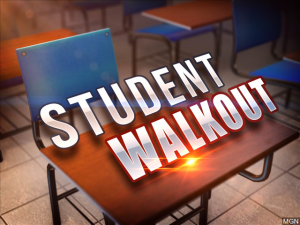Local Government, Civic Affairs and Education
 A decline in homelessness and a focus on utilizing resources elsewhere means that after almost 40 years the Salvation Army’s Red Shield Lodge homeless shelter on Salem Avenue in Roanoke will close on April 30th. Captain Andy Seiler also says a multi-agency drive to place more people in permanent housing has brought overnight stays from 60 a night down to around 12 in recent months. The Salvation Army-Roanoke is preparing to open a transitional day center for 18 to 24 year olds later this year.
A decline in homelessness and a focus on utilizing resources elsewhere means that after almost 40 years the Salvation Army’s Red Shield Lodge homeless shelter on Salem Avenue in Roanoke will close on April 30th. Captain Andy Seiler also says a multi-agency drive to place more people in permanent housing has brought overnight stays from 60 a night down to around 12 in recent months. The Salvation Army-Roanoke is preparing to open a transitional day center for 18 to 24 year olds later this year.
 ROANOKE, Va. (AP) – A Second Amendment advocacy group says it’s not working with a Virginia woman who says a social services department fired her for having a concealed weapons permit.
ROANOKE, Va. (AP) – A Second Amendment advocacy group says it’s not working with a Virginia woman who says a social services department fired her for having a concealed weapons permit.
Virginia Citizens Defense League President Philip Van Cleave told The Roanoke Times that he had received a message from Chelsea Storm Durham but hadn’t responded. Durham had previously told the newspaper that she was working with the group to pursue a lawsuit against the Roanoke Department of Social Services after social media posts about her firing last Friday went viral.
Durham had said the department’s assistant director said a concern about “workplace safety” listed on her termination notice regarded the permit. A copy of the memo provided to WSLS-TV doesn’t specify the safety concern.
Roanoke has denied firing Durham over the permit.
 After 44-thousand likes and 27-thousand retweets, news of a former Roanoke City Social Services employee getting fired late last week spread quickly. 22-year-old Storm Durham claims she was escorted out of work by three police officers after supervisors said she was a safety risk …just for having a concealed carry permit. The city has issued a release saying the dismissal in question was not based on anyone exercising their second amendment rights. Ms. Durham spoke to WFIR Overnight Report Lillian Boyd about the incident and the aftermath of going viral.
After 44-thousand likes and 27-thousand retweets, news of a former Roanoke City Social Services employee getting fired late last week spread quickly. 22-year-old Storm Durham claims she was escorted out of work by three police officers after supervisors said she was a safety risk …just for having a concealed carry permit. The city has issued a release saying the dismissal in question was not based on anyone exercising their second amendment rights. Ms. Durham spoke to WFIR Overnight Report Lillian Boyd about the incident and the aftermath of going viral.
Today’s Longer Listen with Storm Durham is available on the WFIR News website. Ms. Durham’s Youtube Channel is called “The Conservative Storm.”

Gov. Terry McAuliffe
RICHMOND, Va. (AP) – Former Virginia Gov. Terry McAuliffe is scheduled to be the University of Richmond’s commencement speaker.
The school announced Tuesday that McAuliffe will give the May 13 address.
McAuliffe left office earlier this year and is often mentioned as a possible Democratic presidential hopeful in 2020. He is a vocal critic of President Donald Trump.
The former governor is currently helping raise money for National Democratic Redistricting Committee and has said he plans to help elect Democratic governor’s nationwide this year.

Nancy Hans – Prevention Council of Roanoke County (Hank Ebert photo)
Smart Phones are both a blessing and a curse for some people – and at what age should young children have access to them? That question will addressed at a series of public meetings that begin tonight as WFIR’s Gene Marrano reports:
Meetings will take place from 6:30 p.m. to 7:45 p.m. on the following days:
March 12: Glenvar Middle School (for Glenvar ES, Fort Lewis ES, Masons Cove ES and GMS)/ March 21: William Byrd Middle School (for Bonsack ES, Herman L. Horn ES, Mt. Pleasant ES, W.E. Cundiff ES and WBMS)/ March 27: Cave Spring Middle School (for Back Creek ES, Clearbrook ES, Penn Forest ES and CSMS)/ March 29: Northside Middle School (for Burlington ES, Glen Cove ES, Mtn. View ES and NMS)/ April 18: Hidden Valley Middle School (for Cave Spring ES, Green Valley ES, Oak Grove ES and HVMS)
 RICHMOND, Va. (AP) — As schools around the country brace for student walkouts following the deadly shooting in Parkland, Florida, principals and superintendents are scrambling to perform a delicate balancing act: How to let thousands of students exercise their First Amendment rights while not disrupting school and not pulling administrators into the raging debate over gun control.
RICHMOND, Va. (AP) — As schools around the country brace for student walkouts following the deadly shooting in Parkland, Florida, principals and superintendents are scrambling to perform a delicate balancing act: How to let thousands of students exercise their First Amendment rights while not disrupting school and not pulling administrators into the raging debate over gun control.
Some have taken a hard line, promising to suspend students who walk out, while others are using a softer approach, working with students to set up places on campus where they can remember the victims of the Florida shooting and express their views about school safety and gun control.
Since the Feb. 14 shooting at Marjory Stoneman Douglas High School, demonstrations have sprung up on school campuses around the country. But the first large-scale, coordinated national demonstration is planned for March 14, when organizers of the Women’s March have called for a 17-minute walkout, one minute for each of the 17 students and staff members killed in Florida.
National demonstrations are also planned for March 24, with a march on Washington, D.C.; and on April 20, the 19th anniversary of the Columbine High School massacre in Colorado.
No matter how schools decide to deal with the demonstrations, students have been reassured by Harvard, Yale, MIT, the University of Connecticut, UCLA and dozens of other colleges and universities that their participation won’t affect their chances of getting admitted.
But for middle-school and high-school administrators, figuring out how to allow the demonstrations during school hours has proven challenging. In some cases, it hasn’t gone smoothly.
In Needville, Texas, near Houston, Superintendent Curtis Rhodes was castigated on social media after he warned that students who leave class would be suspended for three days, even if they get parental permission.
“SHAME, SHAME, SHAME ON YOU,” wrote one woman.
In Garretson, South Dakota, administrators canceled a student walkout planned for April 20 after a Facebook posting about the plan drew more than 300 negative comments from adults.
And in Arizona, dozens of students at Ingleside Middle School, near Phoenix, were given one-day suspensions after they left campus on Feb. 27.
Layla Defibaugh, an eighth-grade student at Ingleside, said she wanted to participate in the walkout, but didn’t because of the threatened suspensions. She does plan to join the March 14 walkout, even it means getting suspended.
“It’s important for me to speak my mind on this topic,” she said. “At the end of the day, they shouldn’t be able to punish us for exercising our First Amendment rights.”
AASA, The School Superintendents Association, has fielded dozens of calls and emails from school administrators asking for advice, while the American Civil Liberties Union has received hundreds of inquiries from students about what their rights are and if they can be disciplined for participating in the protests.
The answer depends on each school’s code of conduct and disciplinary policies. Generally, the ACLU has been advising students that because they are required to go to school by law, administrators can discipline them for unexcused absences. But the ACLU also told students in an online training video that administrators can’t punish them more harshly because of the political nature of their demonstrations.
The superintendents association — which is supporting the April 20 walkout— has drafted a list of suggestions for school administrators, including holding a teach-in, a school-led walkout to a spot on campus, or a session on bullying.
“There are ways to engage and harness the students in civic engagement without compromising policies in place on attendance, participation and student safety,” said Noelle Ellerson Ng, associate director for policy and advocacy.
Some schools have embraced the walkouts.
In Mooresville, Indiana, administrators met with 10 high-school student leaders to work out a plan. Mooresville High School Principal Brian Disney said the students plan to use the school’s public address system to read short statements about mental illness, the importance of kindness and standing up against all school violence before inviting all students to gather in a school hallway for 17 minutes of silence.
In Anne Arundel County, Maryland, administrators are still talking with students about how they can participate without violating school rules.
“I think we all realize that for folks who are teenagers right now, this could well be a defining moment in their lives. We want to very much encourage and empower student voices. That said, it has to be done in ways that are safe and appropriate,” said spokesman Bob Mosier.
Some schools are taking a middle ground, neither encouraging nor discouraging students from participating. In Henrico County, Virginia, near Richmond, administrators sent an email to parents saying they are not sanctioning the March 14 walkout, but feel obligated to manage the event because of its heavy promotion on social media. Middle-school principals asked parents to sign a Google document stating whether they give their children permission to participate. Schools plan to provide campus locations for the walkout.
In Somerville, Massachusetts, students say they won’t stop after a single walkout. They’ve started a weekly movement they hope will keep public attention focused on school safety and put pressure on lawmakers to pass stricter gun control laws. The walkouts will be held every Wednesday, said Anika Nayak, 16, a student organizer.
“We’re really just fed up with the lack of action that’s been taken in our country,” Nayak said.
“We don’t think enough people are listening.”
RICHMOND, Va. (AP) — As schools around the country brace for student walkouts following the deadly shooting in Parkland, Florida, principals and superintendents are scrambling to perform a delicate balancing act: How to let thousands of students exercise their First Amendment rights while not disrupting school and not pulling administrators into the raging debate over gun control.
Some have taken a hard line, promising to suspend students who walk out, while others are using a softer approach, working with students to set up places on campus where they can remember the victims of the Florida shooting and express their views about school safety and gun control.
Since the Feb. 14 shooting at Marjory Stoneman Douglas High School, demonstrations have sprung up on school campuses around the country. But the first large-scale, coordinated national demonstration is planned for March 14, when organizers of the Women’s March have called for a 17-minute walkout, one minute for each of the 17 students and staff members killed in Florida.
National demonstrations are also planned for March 24, with a march on Washington, D.C.; and on April 20, the 19th anniversary of the Columbine High School massacre in Colorado.
No matter how schools decide to deal with the demonstrations, students have been reassured by Harvard, Yale, MIT, the University of Connecticut, UCLA and dozens of other colleges and universities that their participation won’t affect their chances of getting admitted.
But for middle-school and high-school administrators, figuring out how to allow the demonstrations during school hours has proven challenging. In some cases, it hasn’t gone smoothly.
In Needville, Texas, near Houston, Superintendent Curtis Rhodes was castigated on social media after he warned that students who leave class would be suspended for three days, even if they get parental permission.
“SHAME, SHAME, SHAME ON YOU,” wrote one woman.
In Garretson, South Dakota, administrators canceled a student walkout planned for April 20 after a Facebook posting about the plan drew more than 300 negative comments from adults.
And in Arizona, dozens of students at Ingleside Middle School, near Phoenix, were given one-day suspensions after they left campus on Feb. 27.
Layla Defibaugh, an eighth-grade student at Ingleside, said she wanted to participate in the walkout, but didn’t because of the threatened suspensions. She does plan to join the March 14 walkout, even it means getting suspended.
“It’s important for me to speak my mind on this topic,” she said. “At the end of the day, they shouldn’t be able to punish us for exercising our First Amendment rights.”
AASA, The School Superintendents Association, has fielded dozens of calls and emails from school administrators asking for advice, while the American Civil Liberties Union has received hundreds of inquiries from students about what their rights are and if they can be disciplined for participating in the protests.
The answer depends on each school’s code of conduct and disciplinary policies. Generally, the ACLU has been advising students that because they are required to go to school by law, administrators can discipline them for unexcused absences. But the ACLU also told students in an online training video that administrators can’t punish them more harshly because of the political nature of their demonstrations.
The superintendents association — which is supporting the April 20 walkout— has drafted a list of suggestions for school administrators, including holding a teach-in, a school-led walkout to a spot on campus, or a session on bullying.
“There are ways to engage and harness the students in civic engagement without compromising policies in place on attendance, participation and student safety,” said Noelle Ellerson Ng, associate director for policy and advocacy.
Some schools have embraced the walkouts.
In Mooresville, Indiana, administrators met with 10 high-school student leaders to work out a plan. Mooresville High School Principal Brian Disney said the students plan to use the school’s public address system to read short statements about mental illness, the importance of kindness and standing up against all school violence before inviting all students to gather in a school hallway for 17 minutes of silence.
In Anne Arundel County, Maryland, administrators are still talking with students about how they can participate without violating school rules.
“I think we all realize that for folks who are teenagers right now, this could well be a defining moment in their lives. We want to very much encourage and empower student voices. That said, it has to be done in ways that are safe and appropriate,” said spokesman Bob Mosier.
Some schools are taking a middle ground, neither encouraging nor discouraging students from participating. In Henrico County, Virginia, near Richmond, administrators sent an email to parents saying they are not sanctioning the March 14 walkout, but feel obligated to manage the event because of its heavy promotion on social media. Middle-school principals asked parents to sign a Google document stating whether they give their children permission to participate. Schools plan to provide campus locations for the walkout.
In Somerville, Massachusetts, students say they won’t stop after a single walkout. They’ve started a weekly movement they hope will keep public attention focused on school safety and put pressure on lawmakers to pass stricter gun control laws. The walkouts will be held every Wednesday, said Anika Nayak, 16, a student organizer.
“We’re really just fed up with the lack of action that’s been taken in our country,” Nayak said.
“We don’t think enough people are listening.”
 SEATTLE (AP) — Recent mass shootings have spurred Congress to try to improve the nation’s gun background check system that has failed on numerous occasions to keep weapons out of the hands of dangerous people.
SEATTLE (AP) — Recent mass shootings have spurred Congress to try to improve the nation’s gun background check system that has failed on numerous occasions to keep weapons out of the hands of dangerous people.
The problem with the legislation, experts say, is that it only works if federal agencies, the military, states, courts and local law enforcement do a better job of sharing information with the background check system — and they have a poor track record in doing so. Some of the nation’s most horrific mass shootings have revealed major holes in the database reporting system, including massacres at Virginia Tech in 2007 and at a Texas church last year.
Despite the failures, many states still aren’t meeting key benchmarks with their background check reporting that enable them to receive federal grants similar to what’s being proposed in the current legislation.
“It’s a completely haphazard system — sometimes it works; sometimes it doesn’t,” said Georgetown University law professor Larry Gostin. “When you’re talking about school children’s lives, rolling the dice isn’t good enough.”
In theory, the FBI’s background check database, tapped by gun dealers during a sale, should have a definitive list of people who are prohibited from having guns — people who have been convicted of crimes, committed to mental institutions, received dishonorable discharges or are addicted to drugs.
But in practice, the database is incomplete.
It’s up to local police, sheriff’s offices, the military, federal and state courts, Indian tribes and in some places, hospitals and treatment providers, to send criminal or mental health records to the National Instant Criminal Background Check System, or NICS, but some don’t always do so, or they may not send them in a timely fashion.
Some agencies don’t know what to send; states often lack funds needed to ensure someone handles the data; no system of audits exists to find out who’s not reporting; and some states lack the political will to set up a functioning and efficient reporting process, experts said.
“The system is riddled with opportunities for human error,” said Kristin Brown, co-president of the Brady Campaign to Prevent Gun Violence.
A proposal in Congress seeks to establish a structured system for federal agencies to send records to the NICS database. Sen. John Cornyn of Texas says the legislation — often referred to as “Fix NICS” — will save lives.
“We should start with what’s achievable and what will actually save lives, and that describes the ‘Fix NICS’ bill. It will help prevent dangerous individuals with criminal convictions and a history of mental illness from buying firearms,” the Republican said.
Often left out of the debate in Washington is the fact that similar legislation passed after the 2007 Virginia Tech massacre, but many records are still not being sent to the database.
The Justice Department even set up a new grant program that offered states help with their reporting system, but many didn’t even bother to apply. In 2016, only 19 states and one tribe received funds totaling $15 million. The number of states currently participating is 31.
Several states aren’t eligible for the grant because they haven’t set up a system that allows a person who was prohibited from having a gun due to mental health issues get their rights restored. The National Rifle Association has long-pushed for those types of restoration requirements, Brown said.
Important mental health records that would have kept Seung-Hui Cho from getting the guns he used to kill 32 people at Virginia Tech were never entered into NICS. The gunman who killed dozens at a Texas church in November was able to purchase weapons because the Air Force didn’t send his domestic violence conviction to the database.
And the father of a teenager who killed himself and four classmates at a Washington state high school in 2014 was able to purchase several guns, including the one his son used, because the Tulalip Tribal Court had not shared his domestic violence protection order with Marysville, Washington, authorities, who would have sent it to the background check system.
Since then, the tribe received a $333,841 grant to help improve its criminal records reporting.
The man who walked into a Carson City, Nevada, IHOP restaurant with an assault weapon in 2011 and killed four people had a history of mental illness, had been diagnosed with schizophrenia and had been taken into custody by police in nearby California under the state’s involuntary commitment law. But under federal law, people are only prohibited from having a firearm if they have been “adjudicated as a mental defective” or committed to a mental institution.
The federal law doesn’t include involuntary commitments.
Some states have enacted their own laws that limit gun ownership based on mental health issues, but they’re all different, according to a report by the National Conference of State Legislatures.
Experts say many agencies don’t know what type of mental health information to send to NICS. Brown said many agencies, hospitals and treatment providers are under the mistaken impression that federal medical privacy laws prevent them from sharing information with the system.
Carson City Sheriff Ken Furlong, who handled the IHOP mass shooting, said the biggest roadblock to creating a comprehensive NICS system is privacy concerns. Some are afraid that if they report their family members, they’ll be arrested, he said, and agencies feel stifled by privacy laws.
“When someone is in crisis, why are we waiting to respond?” Furlong asked. “We have a public safety responsibility to prevent something from happening before we have to use force.”
The federal legislation being considered in Congress might help ensure more criminal records reach the background check database, but it has limitations because Congress can’t force states to enact laws. And it doesn’t address gaps in mental health commitment reporting, said Gostin.
“Because mental health records are critical to the integrity of the system,” he said, “the bill leave a significant gap.”
Some states have passed their own laws requiring agencies to report to NICS, but few keep track of whether that’s happening and most don’t have penalties for failing to submit records.
“They’re not reporting but there are no repercussions,” said Cassandra Crifasi, with the Johns Hopkins Center for Gun Policy and Research. “What is there to encourage people to follow the law?”

Gregory Killough
(Roanoke County Schools release) Dr. Greg Killough, Superintendent of Roanoke County Public Schools, announced March 8 that he will retire at the end of the 2017-2018 school year. Dr. Killough became the superintendent of Roanoke County Public Schools in July 2015 having previously served as the superintendent for Caroline County Public Schools in Caroline County since July 2008. Before that, Dr. Killough served as superintendent in Wise County Public Schools, teacher and coach in Warrenton and Virginia Beach, assistant principal in Virginia Beach, high school principal in Campbell County, supervisor of a Regional Adult Education program for the counties of Amherst, Appomattox, Bedford, Campbell, and Lynchburg City Schools, an assistant superintendent for Instruction in Franklin County, and an adjunct professor at Ferrum College and the University of Virginia.
Jason Moretz, Chairman of the Roanoke County School Board, expressed his thanks to Dr. Killough for his service to the school system, “We are in a better place now than we were three years ago and that’s due to Dr. Killough,” he said. “Under Dr. Killough’s leadership, we were able to implement the largest single pay raise in the history of the school system in 2015. His passion for instruction is evident on a daily basis and I thank him for his leadership,” Moretz added.
In announcing his retirement, Dr. Killough gave the following comments to the Roanoke County School Board: Over 3 years ago, my wife and I were looking at new career options and our prayers were answered when I was offered the opportunity to step into the superintendent position here at Roanoke County Schools. It has been an incredibly fulfilling and rewarding experience to work alongside such a talented, dedicated, and hard-working group of administrators and staff . . . and students of such a high caliber.
After much prayer, my wife, Cathy, and I have made the decision that it is time for us to once again enter a new phase in our lives. Cathy will be retiring from her teaching career at the end of this school year, and while I am not sure that I am ready to step away completely from my days of working, I think we have both agreed that it is time for me to change gears and look for new opportunities that will allow me to spend more time with my family and support my wife who has been by my side and supported me for the past 35 years.
In the coming weeks, the Roanoke County School Board will begin the process to search for a new superintendent.








 A local non-profit has had a decline in donations this winter. WFIR’s Bob Clark has more on this story:
A local non-profit has had a decline in donations this winter. WFIR’s Bob Clark has more on this story: March 14th is a big day for area non-profits. WFIR’s Denise Allen Membreno has more on Roanoke Valley Gives Day.
March 14th is a big day for area non-profits. WFIR’s Denise Allen Membreno has more on Roanoke Valley Gives Day.